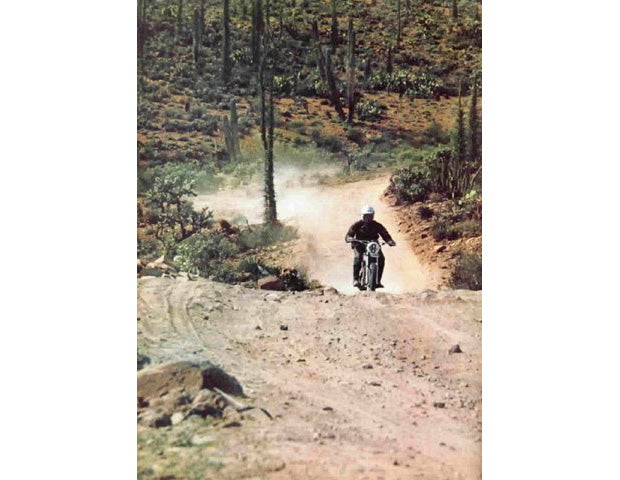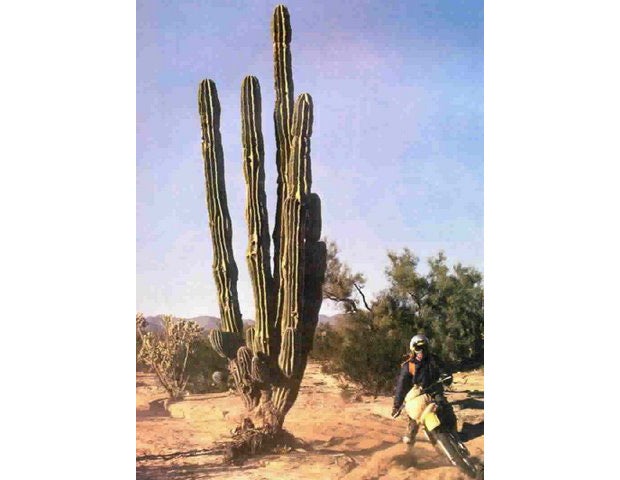
I lived in Baja for 15 years and raced off road there for 11 years. So I figure I can speak with some authority on this subject.
There have been some frightening headlines lately regarding Baja. The big one has been about the people losing their homes in Punta Banda and the other eyeball-snapper was about the un-insured American who had a traffic accident and was held for 18 hours.
I've read the headlines in the U.S. papers about both things and have watched the TV news and heard much about these things on the radio as well. Much of what I've heard has been completely wrong, and the media people reporting it were uninformed. Recently, I spent a considerable amount of time with a Mexican business professional friend of mine, helping him prepare a newsletter for his insurance customers. In the process, we explored Mexican law to a great extent, spent time with various Baja agencies and officials and got some real facts. So, if you want to learn something, read on. Be warned, much of what you will read will be on the "dry" side, but this piece is designed to inform, not entertain.
THE PUNTA BANDA HOME NIGHTMARE
About 300 Americans living in Punta Banda (a beachside community just south of Ensenada) were having huge problems. They're being evicted from their home. As I mentioned, I lived in Baja for 15 years. I have purchased three homes and sold two with no problems whatsoever. The reason my purchases (and sales) were no problem, is that I found out what was required (by Mexican law) to acquire property without a hassle.
Before I even looked for a home in Baja, I spent an hour with an American who was a Mexican lawyer. The cost was $100. I then spent an hour with a good Mexican attorney, who verified what I had been told by the first attorney. They cost was $20. All told, it was time and money well spent.
THE FEDERAL ZONE
You've heard that no Americans can own beachfront property in Mexico. Guess what? No one - including Mexican citizens - can own land in the Federal Zone. The Zone is the land that is 20 meters from mean-average high tide; about 66 feet. In other words, if you drew a line in the sand where the average high tide was, and then took another measurement 20 meters back from that, all that land cannot be owned by anyone - period.
You can, however, use the land for a guaranteed period of time with a Federal Zone Concession. It will cost you an application and processing fee, a monthly fee, and a renewal fee whenever the term for the Concession has expired. The average fee will be between $3500 and $5000 and will depend on the amount of land. The average fee will be about $70 every two months.
The reason I know about Federal Zone Concessions is that part of my first house was right on a cliff overlooking the ocean, and allegedly in the Federal Zone. Allegedly? Well, in 1994 (could be wrong on the year) a little known law was passed that exempted property from the Federal Zone if the land was on an angle - or cliff - more than about 30 degrees. The reasoning was that you could not reasonably be expected to utilize land on a steep cliff. This ruling had no effect whatsoever on people whose land was on a normal, flat beach. In fact, many homes in Baja are split on both normal land and Federal Zone land.

LAND OWNERSHIP AND BANK TRUSTS
No foreigner can own land in Mexico (corporations excepted) that's within approximately 30 miles from the border, or the coastline. To get around this barrier, Mexico has come up with a Bank Trust. Here's how it works:
· You select the property you want and contact a Mexican bank.
· They do all the paperwork (with the help of a notary publico) and make sure the title to the property is free and clear, with no leins or encumbrances.
· They charge you a one-time fee for the trust, which varies, depending on the value of the property. Figure about $4000 for a nice house.
· There's a yearly fee of about $250 to $300 to maintain the trust.
· You get a title called a Fidecomiso that is a legal binding document.
· The bank is the registered owner and you are the beneficiary of the property. You can live in it, or sell it, or even rent it out if you want.
· You get all the benefits.
· The Trust is good for 50 years, and is easily renewable for another 50, and another after that.
· You can leave the house to your kids (or anybody else) if you die.
· You are protected with a bank trust and people do not lose their homes when they have a bank trust.
· In effect, the responsibility for a clean hassle-free title (trust) is with the bank. It's up to them and that's what they charge you for.
· This is the way to acquire property in Baja.
NOW, THE WRONG WAY!
· The worst way to acquire property in Baja is to rent it.
· The next worst way is to lease it.
· The longest a lease is legal in Mexico is one day less than 10 years.
· Any lease longer than 10 years is illegal and does not have to be honored.
· All the stuff you've heard over the years about 33-year and 99-year leases is simply not valid. Sure, people have made deals over the years with Mexican landowners for ultra-long leases and have had no problems. It's because they were dealing with an honorable person who lived up to the lease. However, you must be aware that the long-term leases are no more binding than a handshake.
· If you rent or buy land in Mexico, you must have some sort of a resident permit, normally an FM-3. Therefore, even if you bought land and then let your FM-3 expire, you lose your right to that land until you renew it.
SO WHAT HAPPENED IN PUNTA BANDA?
The people who bought (?) the land in Punta Banda violated nearly every rule I just pointed out. Not one of them acquired a Bank Trust! In addition, they did the following:
· Many of them rented land, then built homes on that land.
· Many of them signed long-term leases.
· It was common knowledge that the land they "acquired" was in dispute, and had been in dispute for a very long time. One family had a legal claim to the land, yet the land had been give to an "ejido" (workers cooperative) group.
· Why anyone would build a home on leased or rented land, knowing that the courts were fighting over the ownership, puzzles me greatly.
· In fact, one former US attorney, retired, rented a lot in Punta Banda, built a home on the lot, and is now complaining that the real landowners want him to leave the rented lot so they can sell it. The court recently decided on the rightful owners.
· These people "acquired" the land at a really low cost. That's how they got sucked in on the deal. The price was just too good to turn down.
· Some of them put a fortune into building a home on rented lots with illegal leases.
While I feel genuinely sorry for the plight of these people, they didn't do their homework when coming to a foreign country. And now they're paying the price. Would they use this approach if they retired to Germany, or France, or Italy? Think about it: You're moving to a foreign country to live and you did not take the time to learn what you need to know! In the U.S., no one would think about even buying a car without getting a clear title, and these folks built luxury homes on rented and leased lots.

MEXICAN INSURANCE
There's been a huge amount of controversy regarding Mexican insurance lately, with the headline -gathering accident of a few years ago. Rumors are everywhere and no one seems to know just what your insurance covers, and what it DOES NOT cover.
THE FACTS
· If you purchase Mexican insurance here, or on the U.S. side, chances are your "normal" liability policy covers only your car against third parties. This means that if you hit someone and it's your fault, the other party will be covered for damages to their vehicle and for medical.
· If you have full coverage, the third party will be covered, as will your vehicle and your occupants.
· When you use a toll road in Baja, you are issued a receipt. Keep this, as it gives you third party property damage protection and medical coverage for you and those in your vehicle. Please note that this toll receipt does not guarantee you legal council, or post a bond for you, in case of a felony accident.
· In the highly publicized recent Kraft accident, Mr. Kraft DID NOT HAVE MEXICAN INSURANCE when he had the serious accident. He only had the toll receipt, which protected him his occupants and the third party with medical insurance.
· Under Mexican law, if any person in the accident (either party) receives a major injury (one that would not be healed in two weeks), the accident then BECOMES A FELONY.
Right now, people are paranoid about coming to Baja. But this need not be the case. You simply must take the proper precautions, which include:
1. Get Mexican insurance.
2. Make sure that the insurance you purchase has legal aid, which includes attorney fees and bond posting.
3. We checked with Instant Mexico Auto Insurance (a popular insurance spot in San Ysidro, http://www.instant-mex-auto-insur.com/) and they told us that it cost only a few bucks per day extra to get the legal/bond coverage. If you buy full coverage insurance from them, the legal/bond coverage is included with the package.
4. So, if you plan to purchase basic liability (the minimum), you should add the legal/bond to protect yourself completely.
5. If you are currently living in Baja and have your insurance already, it has the legal/bond coverage you need if you're dealing with a good agent. I use Jorge Cuadros, who makes sure that all of his customers get the right stuff. His office is in Rosarito and the phone is 011-52-661-21295. Jorge will even take your insurance order over the phone so you don't have to stop before the border when crossing. I've known Jorge (George) for many years and he's a straight shooter. Keep that number handy if you have some special needs, like bringing in a boat or RV.
6. If you're going to race in Baja, or just ride off-road for fun, get the full coverage.


 Your Privacy Choices
Your Privacy Choices